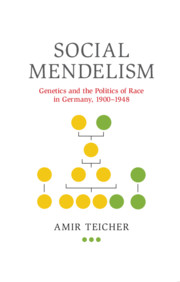Book contents
- Social Mendelism
- Social Mendelism
- Copyright page
- Dedication
- Epigraph
- Contents
- Figures
- Acknowledgments
- Abbreviations
- Introduction
- 1 Mendel’s Laws and Their Application to Humans, 1865–1913
- 2 Mendelism Maturing: From Experimental to Interpretative Framework, 1913–1933
- 3 Mendelism, Purity and National Renewal
- 4 Annihilating Defective Genes: Mendelian Consciousness and the Sterilization Campaign
- 5 Mendelizing Racial Antisemitism
- Epilogue: Social Mendelism beyond the Nazis
- Bibliography
- Index
Introduction
Published online by Cambridge University Press: 03 February 2020
- Social Mendelism
- Social Mendelism
- Copyright page
- Dedication
- Epigraph
- Contents
- Figures
- Acknowledgments
- Abbreviations
- Introduction
- 1 Mendel’s Laws and Their Application to Humans, 1865–1913
- 2 Mendelism Maturing: From Experimental to Interpretative Framework, 1913–1933
- 3 Mendelism, Purity and National Renewal
- 4 Annihilating Defective Genes: Mendelian Consciousness and the Sterilization Campaign
- 5 Mendelizing Racial Antisemitism
- Epilogue: Social Mendelism beyond the Nazis
- Bibliography
- Index
Summary
The rediscovery of Gregor Mendel’s studies on plant hybridization at the beginning of the twentieth century marks the starting point of modern genetic research. Many acknowledge the fact that Mendelism informed early twentieth-century hereditarian and eugenic thinking in Germany and in the US. But the view of Mendelism itself remains that of a mechanical, ideologically neutral, possibly even anti-racist theory. Eugenicists’ adoption of Mendelian thinking is often seen as dogmatic, overtly simplistic and pseudo-scientific. The moral and analytical benefit of using the label "pseudo-science" when discussing eugenics/racial-hygiene and racial science is, however, greatly limited. Mendelism was a sound and rich theory, and the attempts to apply it to the human domain were genuine and serious. It was also a theory with clear social and political implications, which changed its function as the decades passed and as it was appropriated by scholars working in different scientific realms (anthropology, psychiatry, genealogy) and as it moved between the social and the political domains. It strongly imprinted Nazi sterilization and antisemitic policies and had lasting impact well after 1945.
- Type
- Chapter
- Information
- Social MendelismGenetics and the Politics of Race in Germany, 1900–1948, pp. 1 - 21Publisher: Cambridge University PressPrint publication year: 2020

